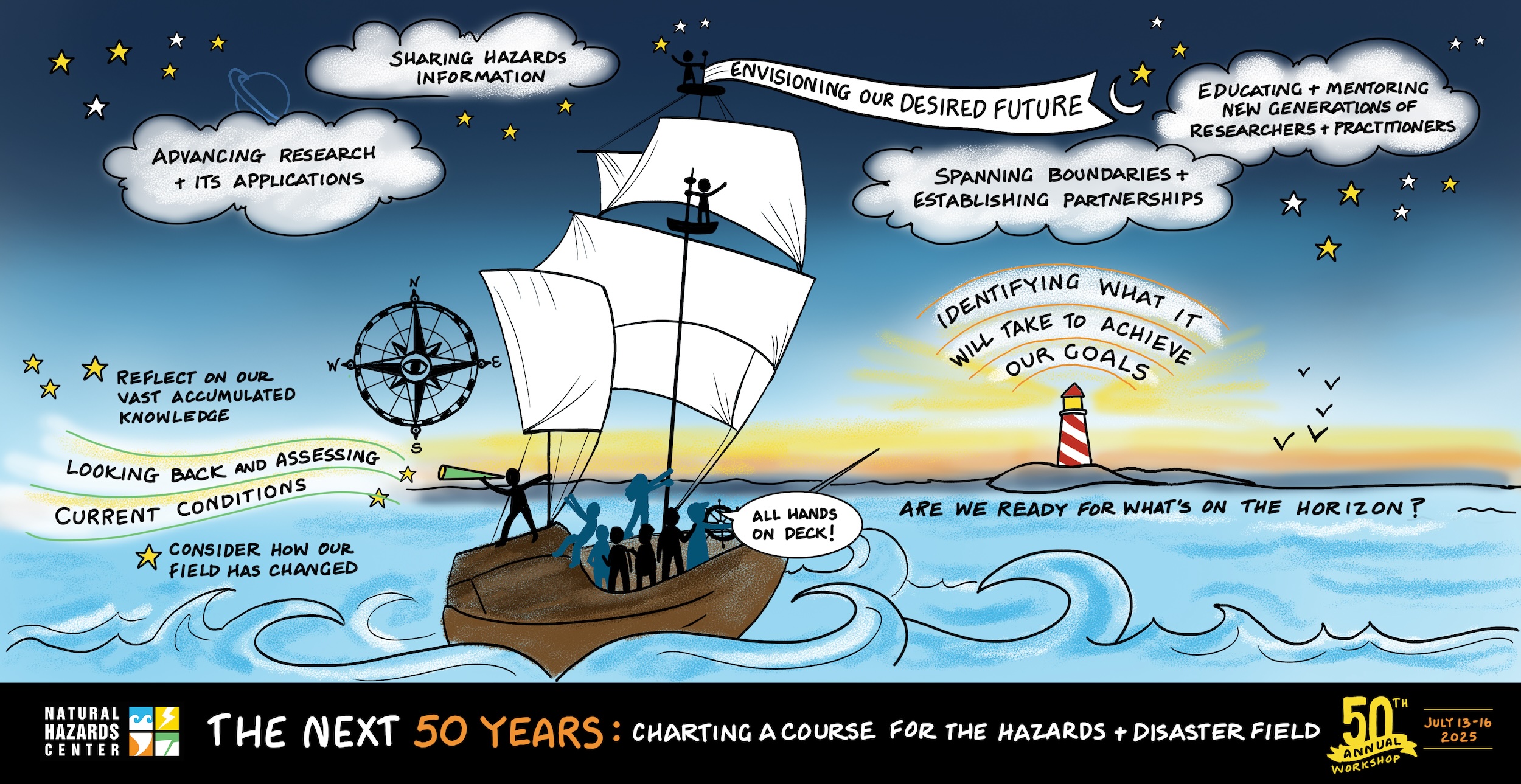Workshop Theme
The Next 50 Years: Charting a Course for the Hazards and Disaster Field
Since 1975, the Workshop has helped anchor the hazards and disaster community. This gathering has always offered us an opportunity to ground ourselves in emerging research, assess new risks and recent disasters, and champion evidence-based programs and policies that avert harm and suffering.
While the purpose of the meeting has remained much the same over the years, the contexts in which we work have not. Our physical environment is changing rapidly, and our communities are undergoing dramatic demographic, socioeconomic, and technological transformations. Consider that in the five decades since the Workshop first convened, the world’s population has doubled, the number of recorded disasters has surged, gaps between the rich and the rest of society have widened, and smart phone and social media use have become ubiquitous.
While no person or algorithm can predict what the next 50 years will hold, it is clear we are facing a sea of change. It is vital that the extraordinary members of this community are not unmoored by the uncertainty that swirls all around us. This is why we are determined to use our 50th Workshop to chart a course forward.
Looking Back and Assessing Current Conditions
We will invite participants to reflect on the vast knowledge we’ve accumulated over the decades. What research findings and policy applications have withstood the test of time? And how are changing conditions in our natural, built, social, and political environments challenging conventional approaches to hazards management?
We will also consider how our field itself has evolved. Our workforce has certainly grown larger and more diverse. Yet many people and agencies now operate in what feels like a continual state of emergency as severe storms, wildfires, drought, and other unrelenting environmental extremes upend communities. How is the rapid intensification and growing complexity of disasters altering our capacity to understand and mitigate them?
Envisioning Our Desired Future
Much of our work in this field is dedicated to envisioning worst-case scenarios. This is necessary as it helps us to act before threats turn into disasters. At this year’s Workshop, however, we are going to entertain best-case scenarios. We will invite each participant to offer ideas about our desired future in the following four areas: (1) advancing research and its applications; (2) sharing hazards information; (3) spanning boundaries and establishing partnerships; and (4) educating and mentoring new generations of researchers and practitioners. These four pillars are key to the work of the Natural Hazards Center, and we believe they can help unlock forward progress for the future of our field.
Identifying What It Will Take to Achieve Our Goals
After establishing what we know and where we want to go, we will engage in practical conversations about how to navigate our way forward. What resources do members of our community need? What connections must be forged? What institutional structures, policies, or programs need to be created so that we are ready for what’s on the horizon? We will also explore how progress will be measured.
Our field is at a turning point. This is our moment to come together and imagine the unimaginable, to ensure that the impact of our work continues for the next 50 years and beyond. To do that, we need all hands on deck. Please join us.
We look forward to celebrating this 50th anniversary with you. We are also eager and ready to do this essential work, together. This is your Workshop, and at this pivotal moment in history, your ideas, perspectives, and voice are needed more than ever.
Please take care of yourself and others,
Lori Peek, Director
Natural Hazards Center
Questions?
If you have any questions, you can contact the Natural Hazards Center team at hazards.workshop@colorado.edu. Please update your contact information so you’ll receive Workshop updates and other information!
